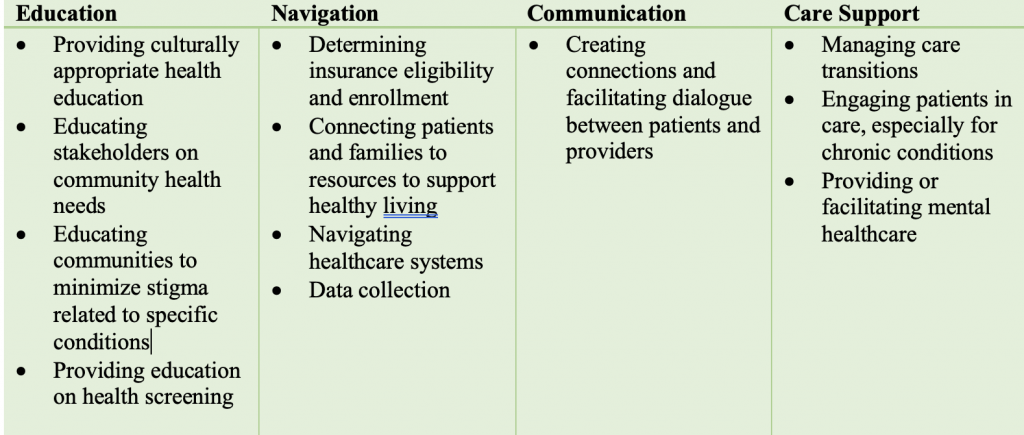The Unsung Heroes of Healthcare: Community Health Workers
As industry and advocacy organizations consider methods for engaging with more diverse, historically inaccessible audiences, consider the possibility of engagement with community health workers (CHWs) and CHW organizations.
In recent years, the lack of diversity and inclusion within clinical trials and the inaccessibility of quality care has gone from suspicion to fact. Research has uncovered unmet needs and the complex barriers people face—related to race, sex, gender, socioeconomic status, age, or other factors—when they find themselves in need of care. Black communities often have an inherent mistrust of the healthcare system driven by decades of scientific and institutional racism. Cultural differences, language barriers, and lack of quality medical care among the Latinx community prohibit them from seeking medical attention.[i] As the healthcare industry works toward a future where existing barriers no longer inhibit quality care or participation in research, the utilization of and partnership with representatives and navigators with culturally meaningful experience will be the crux of success.
Enter the Community Health Worker (CHW)
The Health Resources and Services Administration of the U.S. Department of Health and Human Services defines CHWs as “public health and/or social service workers who are close to and serve members of the community by helping them to adopt healthy behaviors. They may work for pay or as volunteers for a local agency, organization, or healthcare facility. CHWs share similarities with the community members they serve, such as ethnicity, language, culture, socioeconomic status, values, and life experiences.”[ii]
CHWs are trained and certified through accreditation programs that teach them the skills needed to dynamically adapt and serve the communities they are working with.[iii] The implementation of CHW programs is growing, showing consistent levels of success. Throughout the U.S., hospitals are including CHWs as a part of multidisciplinary care teams, giving them a vital role in patient care. As of May 2022, there were 61,300 CHWs in the United States, most of them being employed in local government or individual/family services, followed by outpatient care settings and hospitals.[iv]
These individuals offer unique skills and services in a variety of areas, such as:ii

Across the globe, CHWs are uniquely positioned and astutely aware of community unmet needs and the appropriate ways to reach them. Countries such as Bangladesh, Brazil, Iran, Ethiopia, and Nepal have invested in large-scale CHWs and have been leaders in improving population health.[i] Although a formal distinction of CHWs does not exist in Europe, they have been utilized in HIV care and other disease areas with demonstrated impact in optimizing patient outcomes.[ii]
CHWs support a broad spectrum of work, ranging from local case management, crisis and pandemic response, healthcare infrastructure and accessibility support, and more. The scope of their work is dependent on the country they’re working in and the setting (e.g., primary care). During the COVID-19 pandemic, CHWs were mobilized in communities to eradicate misinformation and educate individuals about paths to prevention, protection, and care.
NEJM reported that “New York–Presbyterian Hospital and the NYU Grossman School of Medicine, brought CHWs into their multidisciplinary plan to managing care during the COVID-19 pandemic. In collaboration with community-based organizations, CHW teams proactively contacted socially isolated patients, connecting them with sources of critically important care and support. This experience has shown that, during times of crisis, CHWs may be the lone connection between some patients and an ever-changing — and increasingly digital — health care system.”[iii]
Pharmaceutical companies are beginning to see the implicit value of CHWs and have engaged these individuals through 1:1 engagements and large-scale efforts to better support CHWs’ needs and available resources.
Johnson & Johnson
In 2020, Johnson & Johnson (J&J) established the Center for Health Worker Innovation to address healthcare worker shortages and arm health workers with the necessary tools to succeed. As part of the Center’s founding, J&J committed $250 million to support 1 million nurses, midwives, and community health workers, reaching 100 million people by 2030. J&J has also made a concerted effort in supporting Community Health Centers to improve health equity.
Regeneron
Regeneron supported the National Association of Community Health Workers (NACHW) and the American Diabetes Association’s (ADA) Focus on Diabetes initiative to help with the early detection of eye disease caused by diabetes. As part of the initiative, the ADA and NACHW collaborated on the development of multi-lingual educational materials such as toolkits, handouts, one-pagers, FAQs, etc. and multiple webinars. These tools are not only valuable for CHWs’ education but for the individuals in their care.
While CHW programs have demonstrated success and inherent value in a multitude of scenarios, CHW programs still need support to continue to evolve and adapt to the ever-changing nature of healthcare needs and experiences. Pharmaceutical companies can play a crucial role in helping to support the infrastructure and resources needed to make a meaningful difference in CHW programs. The boots-on-the-ground capabilities of community health workers, combined with their deep understanding of lived experiences, position CHWs as indispensable partners in reaching hard-to-reach populations.
—
Organizations Representing Community Health Workers
Global:
US-National:
Community Health Worker Coalition for Migrants and Refugees
Rural Community Health Worker Network
National Association of Community Health Workers
National Healthcare for the Homeless Council
National Council for Community Well Being
US State/Regional:
California Association of Community Health Workers
The Community Health Worker Network of NYC
Community Health Workers Association of Rochester
Texas Association of Promotores & Community Health Workers
San Antonio Community Health Workers Association (SACHWA)
Massachusetts Association of Community Health Workers
South Carolina Community Health Worker Association (SCCHWA)
Community Health Workers Association of Connecticut
Oregon Community Health Workers Association (ORCHWA)
Nevada Community Health Worker Association
Idaho Community Health Workers Association
Utah Community Health Workers Association
Arizona Community Health Workers Association
New Mexico Community Health Worker Association
Alliance of Colorado Community Health Workers
Oregon Community Health Workers Association
[i] https://health-policy-systems.biomedcentral.com/articles/10.1186/s12961-021-00761-7
[ii] https://www.ncbi.nlm.nih.gov/pmc/articles/PMC9265352/
[iii] https://www.nejm.org/doi/full/10.1056/NEJMp2022641
[i] https://www.pewresearch.org/science/2022/06/14/hispanic-americans-experiences-with-health-care/
[ii] https://www.ruralhealthinfo.org/toolkits/community-health-workers/1/introduction
[iii] https://www.webmd.com/a-to-z-guides/what-is-community-health-worker
